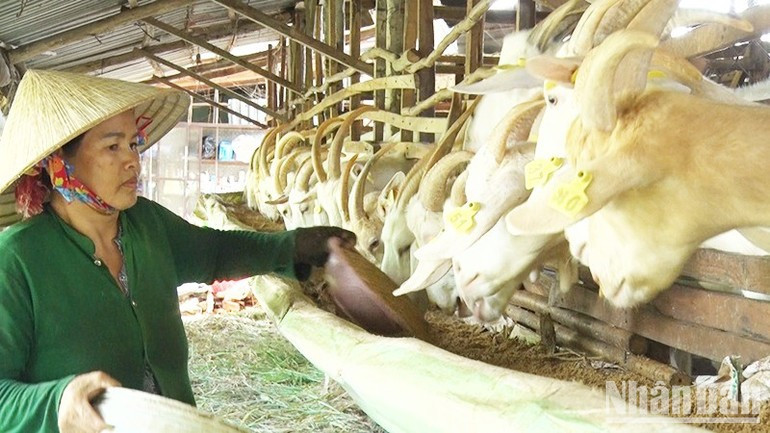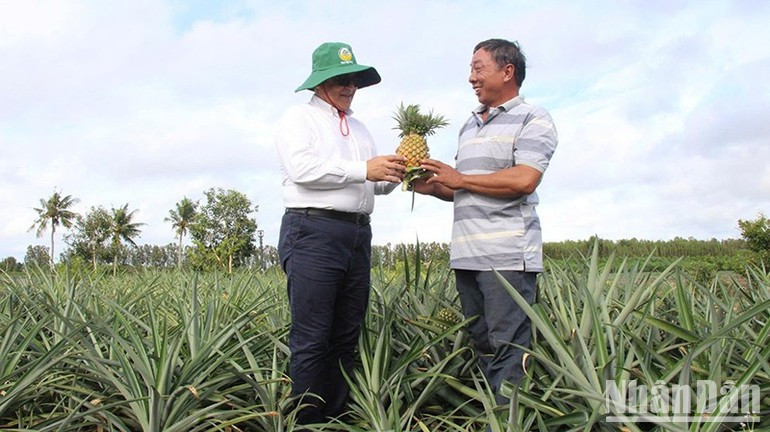Can Tho taps into ecotourism potential
In recent years, farmers in Can Tho have constantly innovated and created new models of ecotourism and community-based tourism linked with agricultural and rural experiences, contributing to realising the tourism industry’s growth targets.

Making the most of existing potential
Most ecotourism and community tourism sites in Can Tho are closely associated with the distinctive river landscape of the Mekong Delta. Their key attractions include visits to fruit orchards and farms, and opportunities to observe production processes. Many of these sites also offer traditional folk games, culinary experiences, and the preparation of local speciality dishes.
Some destinations additionally promote OCOP products as souvenirs, provide services for organising parties, and host don ca tai tu performances. Examples include Thien An Strawberry Garden, Tu Sang Bamboo Grove, Ngoc Dao Goat Milk Farm, Muong Dinh Homestay, Bamboo Garden Tourist Attraction, and Nga Bay Song Garden.
The Ngoc Dao Goat Milk Farm in Tan Hoa Commune is one of many attractive ecotourism destinations contributing distinctive features to the local agricultural tourism landscape. Established in 2010 with the aim of supplying high-quality goat milk to the market, the farm started with just a few goats but has steadily expanded thanks to passion and dedicated care.
Today, the farm not only provides fresh goat milk but also produces a range of processed dairy products, meeting rising consumer demand. According to owner Nguyen Van Dua, the farm has been welcoming visitors since 2018, offering speciality goat milk products. Tourists can visit the goat-raising area, feed the animals, learn about herd development, and observe milking and production processes. They can also enjoy dishes made from goat milk alongside other local specialities of the southwestern region.

Nguyen Thi Ngoc Tran, a tourist from An Giang Province, shared: “Goats are gentle and adorable, both children and adults enjoy playing with them. When I come here, I feel peaceful and close to the nature.”
Benefiting from its fruit-growing tradition, Can Tho has seen many orchards succeed in developing agricultural and ecotourism models, offering homestay and farm-stay experiences as well as fruit garden tours.
A typical example is the three-hectare 9 Hung fruit orchard in Dai Thanh Ward, a popular destination for visitors who enjoy exploring and immersing themselves in nature. Guests can tour rambutan orchards laden with fruit, wear ao ba shirts to wade into ditches to catch fish, and savour rustic countryside dishes.
Another distinctive river tourism attraction in Can Tho is Nga Bay Song Garden, located in Nga Bay Ward. This site offers a harmonious blend of cultural and natural ecology, creating memorable experiences for visitors.
Owner Tan Thanh Trung explained that guests board boats to meander along canals and waterways, visiting fruit orchards heavy with produce, breathing fresh air, and exploring the Nga Bay River while relaxing to the sounds of folk songs.
At Nga Bay Song Garden, visitors can enjoy countryside specialities such as chicken steamed with salt and chilli, grilled snakehead fish, roasted wild duck, eel braised with rice paddy herb, and assorted traditional southern cakes.
Duong Thi Thu Thuy from Ho Chi Minh City shared: “Nga Bay is not unfamiliar to me, as I have been here before. But this return visit has been completely different. Breathing the fresh air at Thien An Strawberry Garden, exploring historical sites, and taking part in the cooking of dishes like snakehead fish and climbing perch were unforgettable culinary experiences.”
Making use of sandbanks along the Hau River, Can Tho has also developed agricultural ecotourism linked to the culture of southern river life. In the Phong Dien area, ecological resort tourism has flourished with multi-experience destinations such as Can Tho Eco Resort and My Khanh Tourism Village.
Investment and connectivity needed for development
According to the Mekong Delta Tourism Association, Can Tho and the wider region still hold vast ecotourism potential. However, many localities have yet to attract sufficient investment or achieve effective development. Tourism remains largely spontaneous and lacks professionalism, with products relying mainly on nature and existing resources, but without long-term planning or connectivity.
Moreover, because of similarities in tourism resources, most provinces focus on the same products, meaning unique values have not been fully harnessed to provide authentic river-based experiences.
Tourism businesses believe that with its diversity of natural, cultural and culinary resources, the region has many opportunities to refresh and upgrade tourism products. By drawing on indigenous culture, people and landscapes, operators can create distinctive and memorable offerings.
It is also essential to provide more information on ecotourism sites and to strengthen connections between tour routes and accommodation options, giving tourists greater convenience and choice.

Sam Long Giang, Deputy Director of the Can Tho Department of Culture, Sports and Tourism, said: “In recent years, Can Tho’s tourism has witnessed continuous growth, becoming an attractive destination within the Mekong Delta and nationwide. Particularly, since July 2025, Can Tho’s merger with Hau Giang and Soc Trang Provinces has enriched its potential and diversified its tourism products, opening up many opportunities for strong development in the future.”
Looking ahead, the Can Tho Department of Culture, Sports and Tourism will review local tourism areas to highlight their potential and advantages, making better use of resources in the new development space. The department also plans to propose mechanisms to attract investment into river-based ecotourism and to strengthen linkages with other localities, further promoting Can Tho’s role as the centre of the Mekong Delta.








